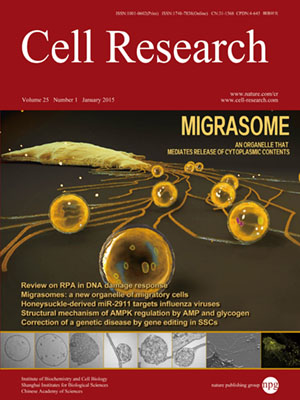
Volume 25, No 1, Jan 2015
ISSN: 1001-0602
EISSN: 1748-7838 2018
impact factor 17.848*
(Clarivate Analytics, 2019)
Volume 25 Issue 1, January 2015: 93-109
ORIGINAL ARTICLES
SCFSlmb E3 ligase-mediated degradation of Expanded is inhibited by the Hippo pathway in Drosophila
Hongtao Zhang1,2,*, Changqing Li1,*, Hanqing Chen1,2, Chuanxian Wei1,2, Fei Dai1,2, Honggang Wu1,2, Wen Dui1,2, Wu-Min Deng3 and Renjie Jiao1,4
1State Key Laboratory of Brain and Cognitive Science, Institute of Biophysics, the Chinese Academy of Sciences, Datun Road 15, Beijing 100101, China
2University of Chinese Academy of Sciences, Beijing 100080, China
3Department of Biological Science, Florida State University, Tallahassee, Florida 32304-4295, USA
4Guangzhou Hoffmann Institute of Immunology, School of Basic Sciences, Guangzhou Medical University, Dongfengxi Road 195, Guangzhou, Guangdong 510182, China
Correspondence: Renjie Jiao, Tel: +86-10-6486-7568 E-mail: rjiao@sun5.ibp.ac.cn; Wu-Min Deng, Tel: +1-850-6451501(wumin@bio.fsu.edu)
Deregulation of the evolutionarily conserved Hippo pathway has been implicated in abnormal development of animals and in several types of cancer. One mechanism of Hippo pathway regulation is achieved by controlling the stability of its regulatory components. However, the executive E3 ligases that are involved in this process, and how the process is regulated, remain poorly defined. In this study, we identify, through a genetic candidate screen, the SCFSlmb E3 ligase as a novel negative regulator of the Hippo pathway in Drosophila imaginal tissues via mediation of the degradation of Expanded (Ex). Mechanistic study shows that Slmb-mediated degradation of Ex is inhibited by the Hippo signaling. Considering the fact that Hippo signaling suppresses the transcription of ex, we propose that the Hippo pathway employs a double security mechanism to ensure fine-tuned homeostasis during development.
10.1038/cr.2014.166
FULL TEXT | PDF
Browse 2421


